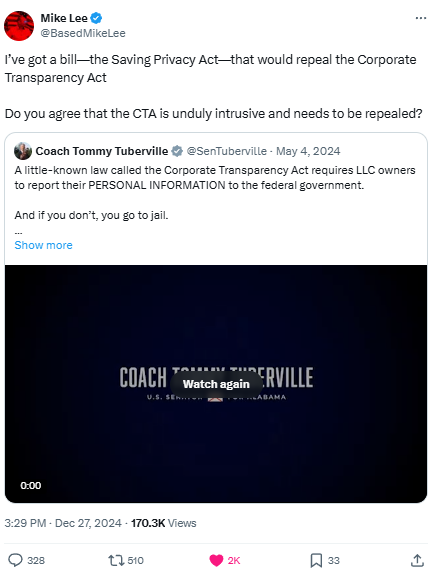Notable Developments
- Government appeals to SCOTUS
- Lawmakers still pushing for CTA repeal
- Yet another Treasury hack
* * *
Legal Update
Immediately following the reinstatement of the nationwide injunction against the CTA by the Fifth Circuit, the government asked the U.S. Supreme Court to overturn that ruling and restore the filing deadline while the broader case remains pending. As SCOTUS Blog notes, the government’s argument focuses in part on whether federal courts have the authority to issue nationwide injunctions in the first place:
More broadly, [Solicitor General] Prelogar suggested that the justices could weigh in on the propriety of so-called “universal injunctions” – orders barring the government from enforcing the law anywhere in the country. Some of the court’s conservative justices – Clarence Thomas, Neil Gorsuch, and Brett Kavanaugh – have indicated in the past that the Supreme Court should address whether such injunctions are proper.
We’ll be keeping a close eye on those developments but as we noted previously, absent SCOTUS intervention, the nationwide injunction will remain in place at least through March 25th when the Fifth Circuit will hear oral arguments.
* * *
Hill Update
Last week Representatives Harriet Hageman (R-WY) and Warren Davidson (R-OH) penned an excellent op-ed in the Wall Street Journal that calls on lawmakers to repeal the CTA altogether in the new Congress:
Republicans have introduced H.R. 8147, the Repealing Big Brother Overreach Act, which would take this unconstitutional law off the books and protect the privacy and freedom of small businesses and their owners.
The court that issued the injunction against the Corporate Transparency Act called it a “quasi-Orwellian” law that would “rubber-stamp a new form of federal power” with unprecedented mandates, undermine the U.S. system of federalism and set a dangerous precedent. A panel of the Fifth U.S. Circuit Court of appeals stayed the injunction, another panel reinstated it, and the appellate court will hear oral arguments in March.
Congress shouldn’t wait for the courts to rescue it from its own bad ideas. Our policies should unleash the entrepreneurs who fuel innovation, create jobs and keep the American dream alive. We shouldn’t shackle them, regulate them to death and doom them to failure.
Senator Mike Lee (R-UT) also closed out 2024 with a plug for his repeal legislation on X.com:
With the 2024 filing deadline now behind us, it’s encouraging to see lawmakers keeping up the pressure and ensuring the CTA remains front and center. We look forward to seeing both repeal bills reintroduced in the new Congress and working with these Members to getting them enacted.
* * *
Treasury Database Hacked
One of the less-discussed shortcomings of the CTA is that it mandates the collection of tens of millions of pieces of sensitive personal information, and warehouses it all an agency with a spotty record of keeping that data secure. Last week we got a timely reminder of those vulnerabilities, as reported by the Washington Post:
Chinese government hackers breached a highly sensitive office in the Treasury Department that administers economic sanctions against countries and groups of individuals — one of the most potent tools possessed by the United States to achieve national security aims, according to U.S. officials.
…Even unclassified documents can be very useful to a competitor like China, current and former officials said. A breach of OFAC, in particular, could lead to the disclosure of sensitive information about government sanctions deliberations. Before designating a target, OFAC compiles an “administrative record” that purports to show how the evidence collected meets the statutory or regulatory criteria for designation.
The records can include everything from open-source materials to “law enforcement sensitive” information and classified material provided by U.S. or foreign law enforcement, according to four former government officials.
When it comes to securing information collected under the CTA, FinCEN’s stance has essentially been “this time will be different.” Given the relative frequency of these breaches, that’s hard to believe.

